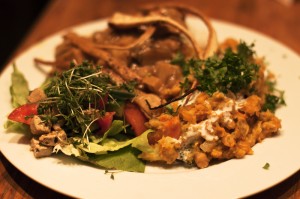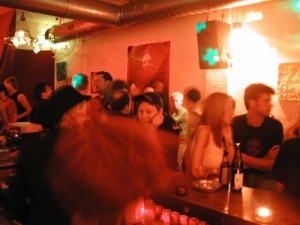Our story…
To explain what is De Peper, we have to look at our roots.
 De Peper (usually called ‘the pepper’ since a sort of English is the main lingo here) originates from the Silo squat Kroeg (1990). The Silo and its cafe-bar were well-known for its creativity and ingenuity, but nonetheless the city chose to
De Peper (usually called ‘the pepper’ since a sort of English is the main lingo here) originates from the Silo squat Kroeg (1990). The Silo and its cafe-bar were well-known for its creativity and ingenuity, but nonetheless the city chose to upgrade destroy this lively part of Amsterdam. After the Silo squat was evicted (1998), part of the community running the kitchen decided to keep the project going; 25 years later, we are still cooking yummy vegan food and hosting events.
Since its origin, the project has always been a creative people’s kitchen run on a volunteer-basis by and for the activist/creative community and operating from squatted locations. People that have no kitchen of their own (such as in new squats), people that normally cannot afford to eat in restaurants (among which many artists, activists, and migrants), and people that have trouble meeting their dietary needs or desires elsewhere in the city (organic, vegan, halal/ kosher, sugar-free/ gluten-free ), could find refuge in De Peper and eat a politically correct super-healthy and tasty dish for just small pocket money. Moreover, they would meet the more interesting people in town and get surprised with all kinds of planned and unplanned creative performances and socio-political stimulations.
 Today, De Peper operates as a member of the EHBK association, running the OT301 (called film academy in old squat lingo) collectively with other groups and individuals. We are now again part of a larger cultural space, just as in the Silo squat. This provides us with a constant and lively stream of visitors, building members and travelling artists to interact with. This collaboration in EHBK also results in De Peper being ‘on the grid’. We are no longer forced to travel from squat to squat and from eviction to eviction, but we do have to pay rent and fit a tight legal framework (e.g. play by the rules) because we are being monitored by the city.
Today, De Peper operates as a member of the EHBK association, running the OT301 (called film academy in old squat lingo) collectively with other groups and individuals. We are now again part of a larger cultural space, just as in the Silo squat. This provides us with a constant and lively stream of visitors, building members and travelling artists to interact with. This collaboration in EHBK also results in De Peper being ‘on the grid’. We are no longer forced to travel from squat to squat and from eviction to eviction, but we do have to pay rent and fit a tight legal framework (e.g. play by the rules) because we are being monitored by the city.
The Peper volunteer collective, whose members have varied over time, managed to keep the creative and political aspirations of its historic past alive as a priority despite its constant changing legal, financial and geographical position.
De Peper still stands for:
- 100% organic, 100% vegan, 0% profit
- healthy and creative food for low costs
- flexibility to meet the needs of a varied and participating public
- inflexibility to violence and discrimination of all sorts
- inspiring and connecting the subcultural creative class
- openness to take aboard or support new people and initiatives